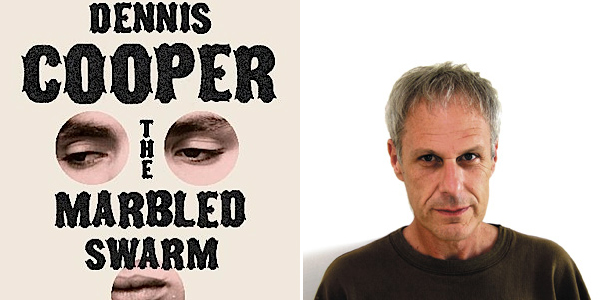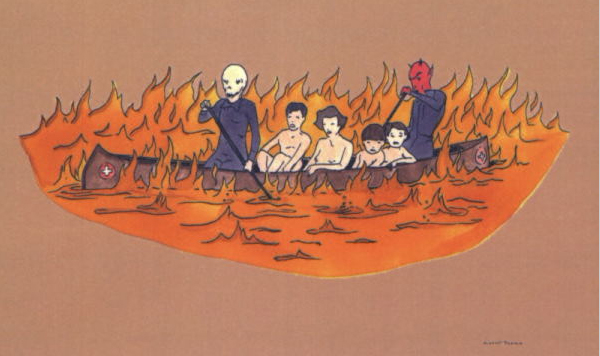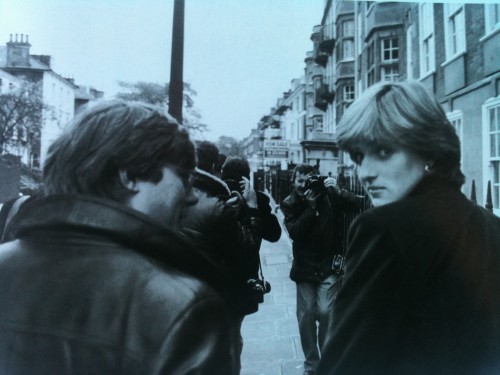Spring Semester Reading List

For those of you who might be interested, click through for the reading list I’ve assigned the students taking my “Introduction to Experimental Literature” course this semester.
My fear arouses me: an interview with Dennis Cooper
The odds are decent that you know Dennis Cooper better than I do. After hearing about his work for years and constantly promising myself that I would try a little someday, I found myself graduated from the MFA program with time to read books of my own choosing again, and so I finally started reading his novels, and I haven’t stopped in the few months since. You’ve already read in this space about his latest book, The Marbled Swarm, a ludicrously powerful book that you really need. After reading The Marbled Swarm I had to send him some painfully earnest fan mail, and he received this note with a grace and generosity that will surprise no one who has read his blog. I asked if I could interview him. He said yes. His answers are more than worth your time; the book demands it.
So I had a really frustrating experience buying The Marbled Swarm at a local independent bookstore. I saw that they had two copies of Blake Butler’s There Is No Year shelved where you would expect, and I figured it would be easy from there because a) you share a press and b) “Butler” is alphabetically pretty close to “Cooper.” After a long search, I had to go ask one of the bookstore employees. She said that your book was supposed to be shelved in gay fiction, with a question mark at the end of her statement. (I was there with my wife; the employee seemed skeptical that I would want a book from the gay fiction section. I was sort of furious about that whole interaction.) And it was there! Do you like being shelved under the category of gay fiction? Do you think it’s been helpful for your work, commercially or otherwise?
I’m always surprised and disappointed when my books are cordoned off like that. I can’t speak to the reasons why that store in particular shelved The Marbled Swarm there, obviously, but, in general, I think it’s the result of a longstanding habit.
When I published my first couple of novels in the late 80s and early 90s, there was this vogue among critics and publishers regarding the notion of ‘gay literature’. I think that was the point where literary arbiters first cottoned onto the idea that there was a historical trajectory involving the work of authors who happened to be gay that had been largely unexplored and was ripe for a thinkfest. Also, there was apparently a decent sized gay male readership of fiction at that time. I remember people in the publishing industry saying that any gay-themed novel was pretty much guaranteed to sell around 5000 copies, so quite a number of writers who happened to be gay were being swept up by major publishers and given small advances based on the logic that the books would at least earn back if not even make everyone involved a bit of money. I’m not sure if that was actually true or not. READ MORE >
Can anyone verify, preferably from a source other than the internet, that Samuel Beckett drove a young André the Giant to school?
New Year Roundup
We’ll get started with the Literary Magazine Club of discussion of Versal on January 9th. Details, here, if you’re playing along. If you want to write something about Versal, and I hope you do, please get in touch with me at roxane at htmlgiant.com. There’s a lot to talk about. For starters, what do you think about the cover?
Over at the Paris Review blog which is always entertaining, Jason Diamond writes about, among other things, “books as objects of design in clothing stores.”
The Millions has a useful list of books we can look forward to in 2012.
James Franco* sold his novel to Amazon. It’s a scandal! Or something! I mean, he’s what? Congratulations? I don’t know! It’s going to be called Actors Anonymous, and yeah…. I, there are no words. Actually, there are words. I am going to make a plot prediction. Young, “handsome” and intelligent actor named Fames Danco takes Hollywood by storm, makes quirky choices, struggles to remain authentic amidst the hypocrisy of Hollywood. After taking a starring role in a big budget movie, say, Mission Impossible 14, he joins a support group, tongue in cheek, to cope with being torn between fame and being true to himself. In the end, he finds a happy compromise by making great independent film choices that lead to many critical accolades and magazine covers. When he wins his Oscar, he thanks the Academy and the nameless members of Actors Anonymous. He also finds love. I will take bets on the accuracy of my prediction.
At Full Stop, Maud Newton takes on the situation in American writing as part of an ongoing series. As always, she is savvy and insightful.
The Rumpus is starting a print publication, where four times a month, or so, they will send you a letter. I’m excited for this. I may be writing a letter. I love getting postal mail. You should consider subscribing.
A League of Their Own is a classic sports film.
Michiko Kakatuni, Twitter, fake account, this is the future.
This movie poster really exists.
Small towns are losing their post offices and it is a real shame.
*Is anyone else disturbed by the Franco storyline on GH right now?
FUSE IS BOOM
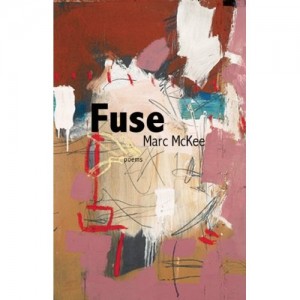
If you asked me who wrote Fuse I’d say it’s a human like you who has lived and died and lived. What’s fresh about Fuse is how Marc McKee manages to stuff so much velocity into poems structured like strong towers. How does he blow shit up and still keep the roof on? As McKee writes, “We must / draw our maps of the impossible.” Fuse is structured chaos; it’s entropy with an MRI of the damages. And the damages are what maybe make a life.
How do you review a life? How do you even review a book? I could give you cogent loop-de-loops in which I try to impress with my best Vendlerese. “The river is talking to the Holiday / Inn. It’s a line I use at parties: / When I am 46. When I am dead,” writes McKee. I could get all language on it so that it really becomes about me and my gutterals. What I want to do is feed you the entire text through the screen, but this is a book you definitely want to hold as an object.
Here is a chunk, from the poem “Dear”:
January 4th, 2012 / 1:04 pm
The Soul Transformative Experience of Writing Itself: An Interview with Ryan Boudinot
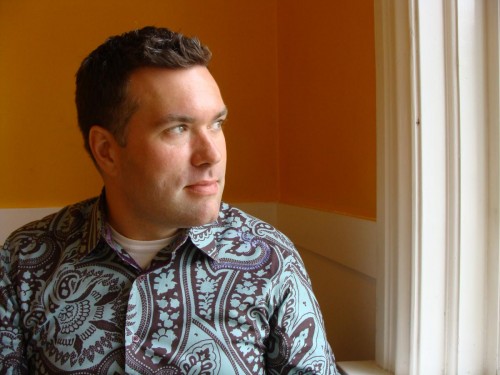
Massive Novel Alert: Today marks the official release of Ryan Boudinot’s massive (in all senses of the word[seriously—it’s going to create a gravity well]) new novel Blueprints of the Afterlife(Grove 2012). I got a chance to read this early on. I like Ryan’s work. I like Ryan. Ryan’s a solid citizen of literature in Seattle. And everywhere. I figured I would like the book.
I didn’t figure it would be as expansive, as imaginative, as powerful, and as quaking as it it.
Seriously. It’s awesome. Take a look. Here’s a sample chapter.
Over the next few days, I’ll be posting some Boudinot appreciations and a round-up. (And if anyone reading has something they’d like to add, feel free to get in touch with me @ giantblinditems @ gmail dot com.) Today, though, we begin with a long interview with the author.
***
You’ve written flash stories, short stories, a short novel, and a really long novel. Do you have a length at which you feel most comfortable?
You’re really wanting me to start this interview with a penis joke, aren’t you?
Heh. For the record, I think that no matter what is said in this email chain, we should use it in the interview. So, that line. And this caveat. We should just use everything said in here.
So, yes. READ MORE >
The Cyberiad
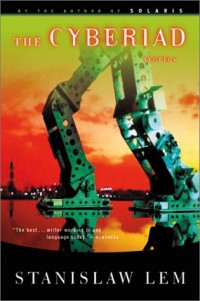 The Cyberiad
The Cyberiad
by Stanislaw Lem
Mariner Books, 2002
312 pages / $13.00 buy from Powell’s
Rating: 8.5
The Cyberiad is labeled as science fiction, but it exists in a world where science is no longer distinguishable from magic. The stories in the book take place in a kind of robot Middle Ages, with mad mechanical kings on tiny planet kingdoms, electronic knights and maidens, and two brilliant constructors named Trurl and Klapaucius who travel from world to world, fabricating wonderfully implausible machines to perform various tasks, from writing brilliant poetry (yes, the robot succeeds in doing this) to distracting a lovelorn king with a “femfatalatron.”
January 3rd, 2012 / 12:09 pm
12 Arctic Char Consulting a Doctor
2. What you want is reliable quality. Like a Glock. The new Diagram is up. I enjoyed Scott McFarland’s “Teenagers with Glocks,” a take/homage on We Real Cool, a poem Gwendolyn Brooks grew to detest, to not want to read, to not want as her “one hit.” But come on, Gwen. Most poets have zero hits.
1. Rather than trimming their sails, a number of independent booksellers are taking a page from Amazon by producing titles themselves.
3. NANO fiction winter sale all that.
12. How to tie the 5 best fishing knots:
5. I see maybe (emphasize maybe) 2 films a year, as in going to actual movies. I saw Dragon Tattoo thingy. I did not leave depressed. Plot (and this is a plot heavy film) pretty much held together. Acting was passable by today’s standards (Rooney Mara very strong). Cinematography didn’t utilize the setting as it could/should have, but it wasn’t weak or distracting/jarring. So then I stumbled on Nordic Noir. Why would Nordic Noir be so literate/popular? Because:
Norway remains, in most people’s consciousnesses, the most imposing of the Nordic countries, with the ancient legacy of the Vikings still casting a shadow over the country (and foreign perceptions of it).
Many of us do seem to be having an Ingmar Bergman moment right now. We love to slouch on our IKEA sofas watching the characters in “Mad Men” as they ruminate on the loneliness and impotence of their lives while staring silently off into darkened rooms filled with Danish modern furniture.
Three factors underpin the success of Nordic crime fiction: language, heroes and setting.
OK
6. The biggest obstacle to me publishing Wild Grass was finding the courage to self-publish. So many people told me it was a bad idea, but deep down I knew it was what I wanted to do.
7. Look, a Caitlin Horrocks story at the Paris Review. Read this.
8. Need a resolution? I suggest never leave “the house without a gun, a knife and a flashlight” Indeed. Lives saved. Or you could just tip properly.
9. Oliver Stone (yes, him) talking about writing in a way maybe we haven’t seen so much? You should probably go ahead and watch this (and the first part). Audience questions, sometimes conflict, a nuanced and, well, interesting Q & A. Be sure to check out the SPAZ “little boy” at 5 minute mark. Wow.
10. How about Amelia Gray rocking the LA Times? She has a ‘face to watch.’ I agree since her face is highly watchable and her prose is highly readable. Gray is actually my current most-given-book-to-promising-students book I give. And it always works. She rocks them. She is the “gateway drug” to better reading, me thinks.
As of yesterday, Ulysses is officially a work of public domain. Now what? [UPDATE: Or not… at least in America. (via Edward Champion)]

